The Boom in Local Food
In the dark cloud of the pandemic, a silver lining for small farmers.
On April 27, about a month after the real Covid-19 lockdown began in our hills, I went online to order some food from Heatherlea Farm Shoppe in Caledon. I was impressed that almost everything they sold in the store was now available with the click of a mouse: chickens, savoury and sweet pies, steaks, preserves, dairy, produce. I could even get Neal Brothers Foods salsa and chips.
I limited myself to a roasting chicken and sausages. The bill came to $52.70. Not cheap, but I was supporting a local business, I knew the chicken would be juicy and flavourful, and I presumed the processing of that chicken had been more humane and likely more hygienic too.
Feeling pretty good about myself, I clicked on delivery options only to learn my order would be ready for “porch pickup” on May 8, almost two weeks hence. Hmm, I thought, quite a wait for a chicken. I hadn’t anticipated a dinner for such a long time since I’d raised roasters from day-old chicks in the 1980s. When I finally did roast my bird, it was excellent. Three of us in lockdown savoured the chicken, the gravy – oh, the gravy – the fixings and our special time together, sharing a meal.
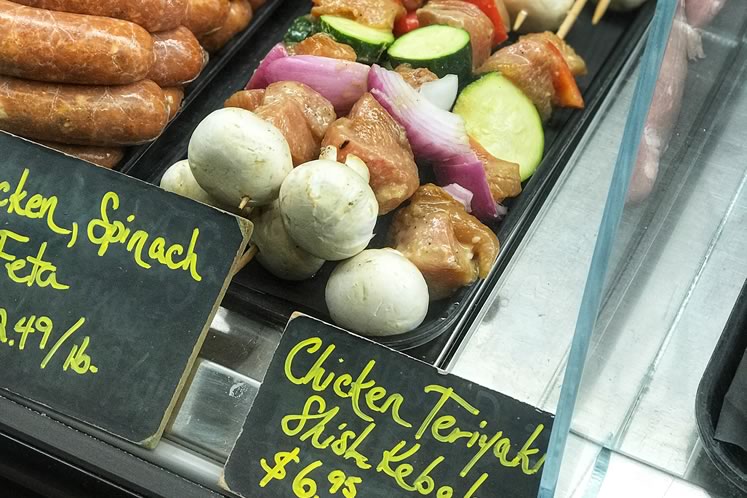
Chicken teriyaki skewers at Heatherlea Farm Shoppe. Photo courtesy Heatherlea Farm Shoppe.
Today, if I ordered that same chicken from Heatherlea, I could pick it up a quick two days later. With remarkable speed, Heatherlea had not only implemented an online system, they’d also sorted out their supply problems – and they did it without waiting around for government assistance.
They weren’t alone. Many other local farms also quickly adapted to an e-commerce platform for online and socially distanced ordering. And their grateful customers leapt on board with equal speed. Tom Wilson, owner of Spirit Tree Estate Cidery in Caledon, says that within five minutes of launching the store’s online system on the Saturday before Easter, they had received orders for cider and baked goods. By Wednesday, they had to shut it down because they’d been swamped. “It was our best Easter ever,” Wilson says.
According to local-food advocate Brent Preston, who owns The New Farm near Singhampton, small food operators have been nimble in their response to the pandemic in part because they have short, flexible supply lines: the strawberries they sell are still warm from the field. It works for small farms who sell direct to their customers. Preston made the remarks during a virtual panel discussion examining Ontario’s food supply, hosted in late May by Ontario Green Party leader Mike Schreiner.
But Preston pointed out that for small producers who want to expand to their markets beyond the farm gate, there are also barriers. That’s because our food system is dominated by large-scale, commercial producers making bulk sales to big supermarket chains connected to each other through a complicated, inflexible supply chain. As panelist and Toronto-based food activist Wayne Roberts noted, “There’s no middle in our local food system.” By which he meant we lack infrastructure connecting independent farmers to the broader consumer market.
As Heatherlea was implementing its online software and fine-tuning its porch pickup, panic buying resulted in something we never expected to see in Canada: empty supermarket shelves. Canada’s large multinationals fell victim to those long, convoluted supply chains that change course with the agility of the Titanic. Consider that the average head of lettuce, according to a University of Waterloo study, travels more than 3,700 kilometres, sometimes crossing the U.S./Canada border several times before you place it in your supermarket shopping cart.
Exacerbating the problem are the host of Covid-19 concerns at several meat and poultry processing facilities. Most notably, a Cargill Ltd. plant in Alberta suffered the largest single outbreak of Covid-19 in the country. Normally, the facility’s 2,000 or so employees process 4,500 head of cattle per day. When Cargill – and Maple Leaf Foods Inc. in Brampton – closed due to Covid-19, there was little to fall back on because many of Ontario’s small, local abattoirs, such as Metheral Meats in Glen Huron, which processed fewer cattle and lambs in a year than Cargill does in a day, closed their doors several years ago. As reported previously in this magazine, these often family-run operations were unable to meet increased government regulations designed, some argued, to force them out of business. The resulting absence of “middle” is contributing to what Preston described as a lack of resilience in our food system.
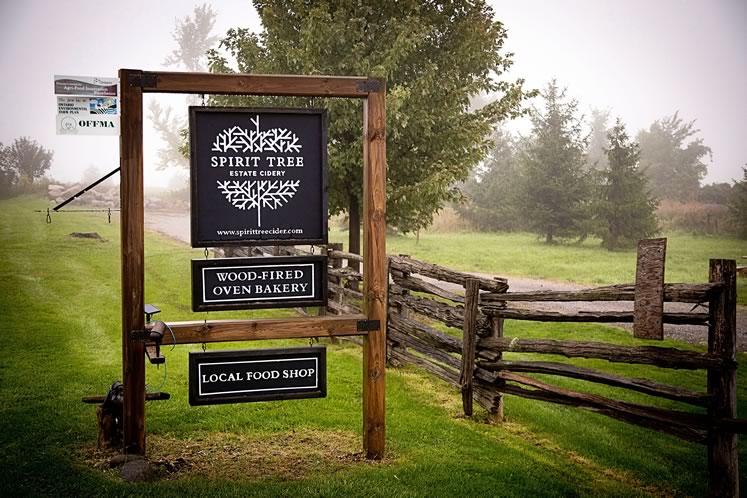
The entrance at Spirit Tree Estate Cidery. Photo by Sarah Rutka.
Nevertheless, the in-your-face media coverage of conditions for both workers and animals in the big slaughterhouses has had a lot of people thinking harder about where their meat, and other food, comes from – and that has been an unanticipated boon to many local farmers.
Heatherlea, for instance, regularly sells out of its $277 Grill Butcher Box. And Calehill Farms, a family-run chicken farm near Hillsburgh, sold out of their first flock this year “so fast our heads are spinning.” They’re now taking orders for later in the summer. Rebecca Landman at Landman Gardens and Bakery near Grand Valley believes that after her customers buy the meat she sells, many of them no longer have an appetite for supermarket fare.
And it’s not just meat. The spike in local vegetable, fruit and beverage sales during the pandemic was repeated across our region. Customers, many of them first-timers, are showing an unprecedented willingness to take the time and spend the money to support local agriculture by purchasing the fresh, healthy products often grown just down the road. Jamie Richards at Am Braigh Farm sells produce mostly from the 200-square-foot store at the end of his Mono driveway. He says, “We’re barely keeping up [with demand].” Fiddle Foot Farm in Mulmur sold 50 per cent more CSA shares than in years past, and they sold out of them two months earlier than usual. Mount Wolfe Farm in Caledon likewise sold out of their CSA shares almost before their seeds were in the ground.
The surge in demand is not without complications though, especially when your “shareholders” are your family and employees. Margaret Galati, who works along with her husband and parents at the venerable Rock Garden Farms in Caledon East, says she feels personally responsible to continue offering her clientele what they expect and want – fresh Ontario-grown produce – even during a pandemic. Galati’s commitment runs deep. “My customers are my family,” she says, and she’s saddened because the face mask she has to wear precludes her customers from enjoying her trademark smile.

Gail Winters posts the pickup schedule at GoodLot Farmstead Brewing Co. Photo by Phil Winters.
Unlike many others, Rock Garden didn’t move to an online system. Instead, they took email orders and hired four extra people to pack them. And they added a host of new products so Galati’s “family” can get pretty much everything they need in one place. “We even sell ketchup now,” she says. Her reward? In April, Rock Garden’s food sales were above normal.
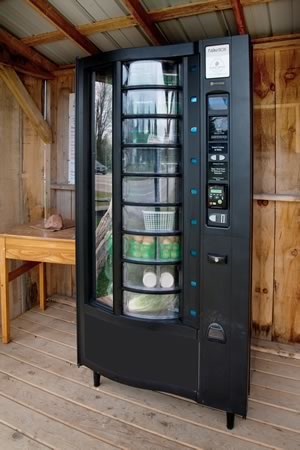
Maple Grove Farm’s vending machine in Mansfield. Photo by Rosemary Hasner / Black Dog Creative Arts.
Two farmers have taken their innovations one step further. Maple Grove has installed a fresh produce vending machine for its strawberries and other produce at its roadside stand in Mansfield, and Besley Country Market has added one at its Shelburne store – making their produce available 24/7. Craving a late-night fix of strawberry shortcake, anyone?
Still, not all parts of everyone’s enterprises have flourished. Those with onsite cafés or bistros or who wholesale to restaurants have been unable to replace those revenue streams with online sales. Spirit Tree and GoodLot Farmstead Brewing Co., for instance, were pulling a significant percentage of their revenue from their now closed on-farm restaurants. Farther north, Sheldon Creek Dairy took a major hit when the restaurants it supplied closed their doors.
Shaken by their loss in income, Sheldon Creek, like Rock Garden, expanded its product line by including many items from neighbouring farms and businesses. Marianne Edward, the dairy’s operations manager, says producers contact her every day wanting her to stock their products. She says, “We often call ourselves a hub.” They’re struggling to keep up with the demand for bacon, pork chops, cream and specialty products such as flavoured milk.
The idea of such hubs is catching on. In Shelburne, for one example, Besley Country Market are best known for their hydroponic tomatoes, but they also proudly promote their inventory of products from other local farms, including Brussels sprouts from Lennox Farm in Melancthon, mushrooms from Fresh and Tasty Mushrooms in Amaranth, and spinach from E & J Collins in Mono, among others.
By co-operatively sourcing products from multiple regional farms, these mini-hubs make it convenient for consumers who want to buy local but are daunted by the prospect of having to travel to several locations to fill their pantries. But as significant, the hubs are an important step in filling out the missing middle of the supply chain for smaller producers.
Another trend farmers have jumped on is the demand for prepared meals with homemade flavour, especially ones you might categorize as comfort food. As the novelty of making meals from scratch faded like the fleeting aroma of freshly baked bread, people got online and purchased ready-made casseroles like our mums used to make: mac and cheese, lasagna and chicken pot pies. At the Creemore 100 Mile Store, a big seller is Chef Patrick’s croissants – maybe not the fare produced by most Ontario mums, but pretty comfy nonetheless. And at Am Braigh, Richards now sells prepared foods made by some of the local chefs he used to supply before their restaurants were shuttered.
For artisanal beverage producers the introduction of specialty items has proved another boost to sales. GoodLot says their first batch of a seasonal beer made with maple sap sold out in 12 hours, the second batch in six hours and the third in just four. Spirit Tree had a similar run on their latest seasonal cider, roasted peach/pear.
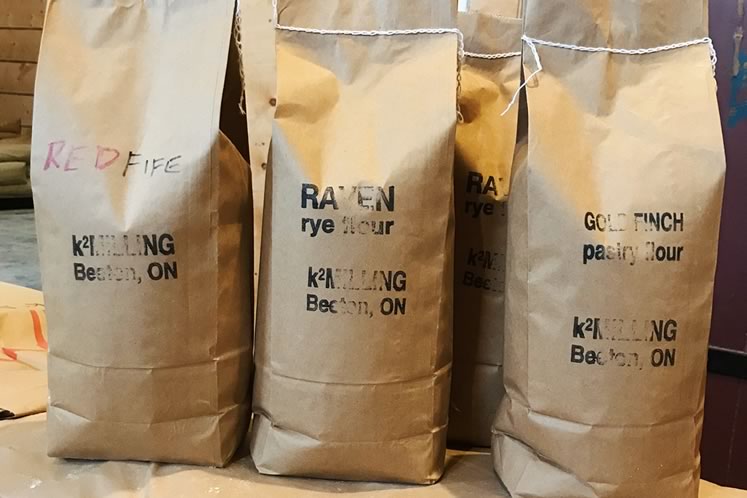
Red fife flour from k2 Milling. Photo by Mark Hayhoe, Kaptain Flour.
And there’s one other benefit of patronizing local farms and food shops – it just feels good. Neal Connolly manages the Creemore 100 Mile Store. It’s a homey space that always smells great. He observed that shopping in his friendly store seems to ease the constant low-level anxiety about Covid-19 that haunts many of his customers. His sales of prepared foods have also gone up, and while it was difficult to find any flour in supermarkets in the early days of the pandemic, Connolly continues to sell a lot of it. He gets it in bulk from k2 Milling in Beeton, then divvies it into smaller bags that fly off the shelves.
It all suggests that in the dark cloud of the pandemic, there may be a silver lining for local farmers. It has had people thinking much harder about where their food comes from, the social benefits that result from their decision to buy local food locally, and the enhanced food security a healthy domestic food sector helps ensure. They’re also more aware that food grown in Ontario and sold at a farm gate or local market often translates into more humane and more hygienic food. At Rock Garden, Galati tells customers her family-run store is essentially their living room and that she is doing everything she can to keep it Covid-19 free, because “if the store goes down, we go down.”
There’s a long row still to hoe for the local food movement, though. During the Green Party panel discussion, Alison Robertson, who heads the Ontario Fruit & Vegetable Growers’ Association, rhetorically asked a bleak question: If all Ontario’s fruit and vegetable producers shut down, would anyone notice? That’s how thin our supply of local produce is. Even the things that grow well in Ontario – strawberries, potatoes, apples – are regularly imported.
Among the practical initiatives the panelists offered to support the domestic food sector are to require public institutions, including prisons, schools and governments at all levels, to source a percentage of their food locally, just as the CBC has a Canadian content mandate. And rather than bail out multinational food conglomerates, suggested Preston, why not invest in local food-processing facilities? Why doesn’t Ontario introduce regulations that favour local production as they have done in Quebec?
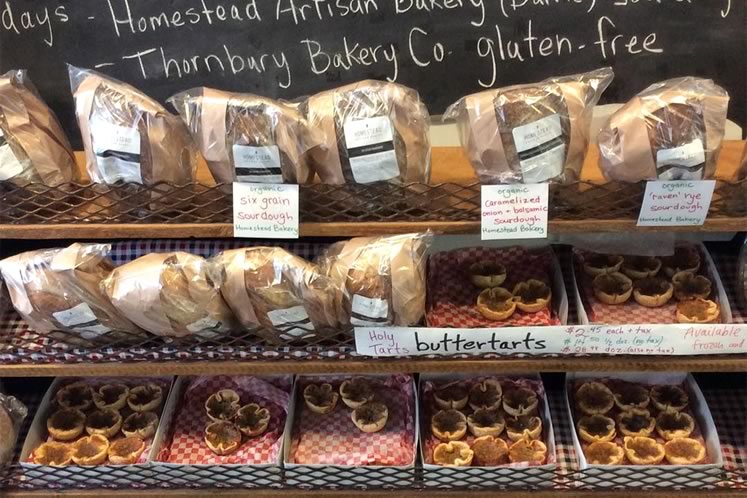
Bread and other baked delights at Creemore 100 Mile Store. Photo courtesy Creemore 100 Mile Store.
But there is another, more intractable problem. Even here in our lush countryside where we are blessed with an abundance of seasonal fresh food, not everyone can afford to pay $5 or $6 a pound for a roaster chicken – no matter how hormone- and antibiotic-free and ethically raised that chicken is – when a battery-raised chicken costs under $3 a pound at the supermarket. Roberts noted that even though the overall cost of food is at an all-time low in Canada, many people still can’t afford to buy healthy, wholesome food. But he argued the resolution to that disconnect will not be found in further driving down income at the farm source, but in dealing with the income inequalities deeply embedded in an economic system skewed to favour corporate shareholders over community well-being. “There is no such thing as cheap food – someone is paying for it,” he said.
Creating a sustainable and resilient local food system won’t be easy, but Connolly from Creemore 100 Mile Store advocates an approach that would help us get there. He says we should stop shopping as consumers and start making our purchases as citizens.
Related Stories

Am Braigh
Apr 24, 2018 | | On-farm storeYear-round vegetables, eggs, sourdough bread, soups and entrées by local chefs using Am Braigh produce
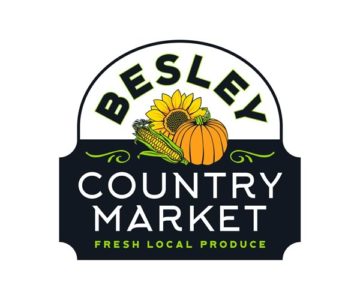
Besley Country Market
Apr 25, 2018 | | Headwaters Farm FreshTomatoes, sweet corn, pumpkins, squash and other seasonal fruits and veggies; baked goods and preserves

Calehill Farms
May 16, 2019 | | Headwaters Farm FreshWhole chicken and chicken cuts, including breast, thigh, drumsticks, wings and sausage; ground chicken burgers; beef halves and quarters, packs, individual cuts

Fiddle Foot Farm
Apr 25, 2018 | | Headwaters Farm FreshOrganically and biodynamically grown vegetables, weekly CSA shares and online custom orders (Sep–Mar)

Heatherlea Farm Shoppe
Apr 25, 2018 | | On-farm storeArtisan dry-aged Angus beef, fresh meats, espresso drinks, baked goods, cheese, produce, heat-and-serve meals, local foods

Landman Gardens and Bakery
Apr 25, 2018 | | On-farm storePork, chicken, eggs, turkey, beef, pickles, salsas, honey, granola, meat pies, fruit pies, baked goods, sandwiches and other local products; patio; workshops

Mount Wolfe Farm
Apr 25, 2018 | | Headwaters Farm FreshSummer and winter vegetables, maple syrup, honey, garlic, eggs, bread, seasonal fruit, preserves, microgreens, home-care products

GoodLot Farmstead Brewing Co.
Apr 26, 2018 | | Craft beveragesOrganic hop farm and solar-powered brewery with tasting room, beer gardens, disc golf and food truck

Rock Garden Farms
Apr 26, 2018 | | Headwaters Farm FreshFresh fruit, vegetables, free-range eggs, maple syrup, homemade preserves, sauces, home-baked pies, garden centre

Sheldon Creek Dairy
Apr 26, 2018 | | Headwaters Farm FreshMilk, cream, yogurt, kefir, sour cream, cheese, ice cream, flavoured milks, meat, preserves; seasonal dairy bar










